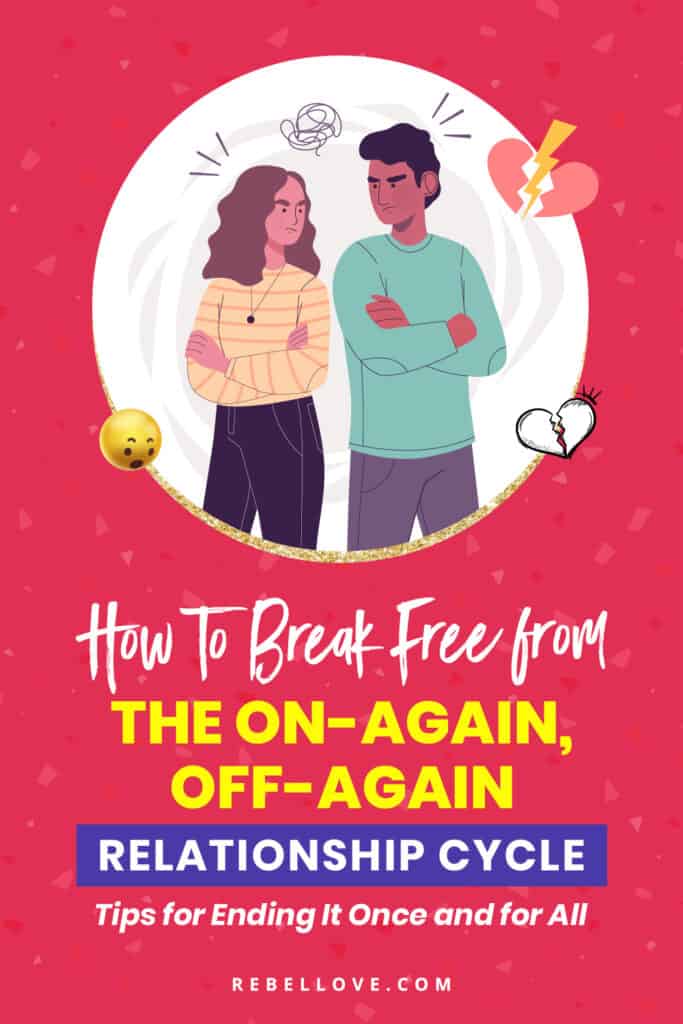This post may contain affiliate links and Rebel Love may be compensated for purchases visitors make through these links. We only promote products and services we really care about and that we think are useful. Read the full policy here.
We live in a culture that tends to glorify hot and cold relationships. Think about Fifty Shades of Grey, the After films, and, of course, we can’t forget the teen pop-cult saga, Twilight. Even music videos like Love The Way You Lie by Eminem and Riri come to mind.
As young adults, we’re fed stories of passion and possession – high highs and low lows. It’s how love is depicted far too often, which leads us into relationships imitating those stories.
For most of us, I’d argue that finding fulfillment in on-again, off-again relationships simply isn’t attainable.
Instability and emotional fatigue are not conducive to healthy, long-term arrangements. For me, being stuck in a relationship that feels good one second but can turn on its head and be over in an instant is the emotional equivalent of bungee jumping without knowing for sure if the cord is securely fastened.
In other words, breakup, makeup, repeat… it ain’t good for you, honey.
Understanding the On-Again, Off-Again Relationship Cycle
An on-again, off-again relationship is characterized by a repetitive pattern of breaking up and reconciling multiple times. Partners in these relationships experience cycles of separation followed by periods of reunion, often without fully resolving underlying issues.
This cycle can become chronic, with individuals finding themselves trapped in a pattern of instability and uncertainty.
How do we get trapped in this cycle?

Several factors may contribute to us becoming ensnared in on-again, off-again relationships, or feeling reluctant in letting it go. Some of those include:
💔 The fear of being alone or starting from scratch.
💔 Feeling a sense of comfort or attachment to the familiarity of the relationship/partner.
💔 Holding onto the belief that things will improve with each reconciliation.
Also, unresolved conflicts and unmet needs within the relationship can keep us tethered to the cycle as we hope for change or resolution with each reunion.
The problem is…
The on-again, off-again relationship cycle can have significant negative effects on mental health.
Constant uncertainty and instability can lead to heightened levels of stress, anxiety, and depression. Eventually, those of us caught in this cycle, may experience feelings of inadequacy, low self-esteem, and a sense of worthlessness as we struggle to navigate the emotional turbulence of our relationship.
The repeated experiences of heartbreak and disappointment can desensitize us to our own emotions and hinder our ability to form healthy attachments in future relationships.
How do we recognize the signs?
Recognizing the signs of being in an on-again, off-again relationship is needed in order to break free from the cycle.

First, it’s essential to recognize the signs, like:
🛑 Frequent breakups followed by reconciliations
🛑 Lack of resolution in conflicts, leading to uncertainty about the relationship’s future
🛑 Intense emotional highs and lows, with sudden mood and behavior shifts
🛑 Constant attempts to change or fix each other
🛑 Concern from family and/or friends
🛑 Cyclical patterns in relationship milestones (e.g., moving in together, engagement), and backtracking
🛑 Accumulation of resentment and frustration over time
🛑 Difficulty making long-term plans or commitments
🛑 Denial or rationalization of relationship dysfunction
Being able to identify the patterns of behavior that keep this cycle going is key. Maybe you and your partner have repeated arguments over the same issues, a tendency to ignore or downplay red flags, or are reliant on temporary fixes rather than addressing underlying issues.
However it appears in our individual relationships, self-awareness will help us recognize the signs, acknowledge our own emotions, motivations, and patterns of behavior within the relationship.
Reflecting on our relationships…
If you resonated with any of the signs above, it may be worth taking a moment to reflect deeper on the reality of your relationship.
Consider how the cycle of breaking up and making up has affected you emotionally, mentally, and physically. Reflect on the highs and lows, the moments of joy and the moments of despair. Acknowledge the patterns and dynamics that have emerged in your relationship, and consider how they have shaped your overall well-being and happiness.
Here are some questions to help get you started:
🤔 How has the on-again, off-again cycle impacted my emotional well-being?
🤔 What patterns do I notice in my relationship dynamics, and how do they affect me?
🤔 What are my motivations for staying in the relationship despite the recurring cycle?
🤔 Am I being honest with myself about the reality of my relationship?
🤔 What do I ultimately want and need from a relationship, and does my current situation align with those desires?
Clarity and honesty are essential in the process of self-reflection. Be honest about the reality of your relationship, even if it’s uncomfortable to confront.
Avoid rationalizing or minimizing the negative aspects of the cycle. Instead, strive for clarity about what you truly want and need in a relationship.
How do we break free from on-again, off-again relationships?
Breaking free from on-again, off-again relationships can feel like navigating a maze with no clear exit. Here are a few simple and empowering steps that, if done consistently, will surely guide you out.
Set Boundaries:
Establishing boundaries will help us define what’s acceptable and what isn’t in the relationship. This will prevent us from getting drawn back into the cycle of breakup and reconciliation.
Some examples of boundaries:
🛑 Communication: Establish clear guidelines for communication, such as setting specific times to discuss relationship issues or limiting contact during periods of separation. This boundary helps prevent impulsive decisions and promotes more thoughtful and constructive communication between partners.
🛑 Breakups: Define what constitutes a breakup and commit to respecting this decision once it’s made. Avoid engaging in repeated breakups and reconciliations without careful consideration, as this perpetuates the cycle of uncertainty and emotional turmoil.
🛑 Personal Space: Respect each other’s need for personal space and independence by establishing boundaries around spending time apart and engaging in individual hobbies or activities. This boundary helps prevent feelings of suffocation and promotes a healthy balance between togetherness and independence within the relationship.
Prioritize Self-Care:
In the midst of the emotional turmoil of an on-again, off-again relationship, prioritizing self-care is crucial. Make time for activities and practices that nourish your physical, emotional, and mental well-being.
Some examples of self-care:
💗 Emotional: Focus on acknowledging and processing your emotions in a healthy way. Practice self-compassion and self-validation, allowing yourself to feel and express your emotions without judgment. Engage in activities that promote emotional healing, such as journaling, meditation, or talking to a trusted friend or therapist.

💗 Physical: Take care of your physical health by prioritizing activities that nourish your body. This includes getting enough sleep, eating nutritious foods, and engaging in regular exercise. Pay attention to your body’s needs and listen to any signs of stress or tension, taking breaks when necessary and practicing relaxation techniques such as deep breathing or mindfulness exercises.
💗 Social: Surround yourself with supportive friends and family members who uplift and encourage you. Prioritize spending time with loved ones who make you feel valued and understood. Seek out positive social interactions and avoid toxic relationships or situations that drain your energy. Additionally, consider joining support groups or seeking professional counseling to connect with others who have experienced similar challenges and receive additional support and guidance.
Focus on Personal Growth:
Embrace this opportunity to focus on your personal growth and self-improvement. Use the space created by ending the on-again, off-again cycle to explore your interests, pursue your goals, and invest in your own development.
Some examples of personal growth focus:
💗 Self-Reflection and Journaling: Set aside time for self-reflection and introspection to gain insight into your thoughts, feelings, and behaviors. Keep a journal to record your reflections, insights, and personal growth journey. Use prompts or questions to guide your reflection process, such as “What patterns do I notice in my relationships?” or “What are my values and goals for the future?”
💗 Skill Building and Learning: Invest in acquiring new skills or knowledge that align with your interests and goals. Take up a hobby or enroll in classes or workshops related to areas you’re passionate about. Whether it’s learning a new language, mastering a musical instrument, or developing professional skills, continuous learning fosters personal growth and self-confidence.
💗 Therapy or Counseling: It’s worth repeating; seek professional help from a therapist or counselor to support your personal growth journey. Therapy provides a safe and supportive environment to explore your thoughts, feelings, and behaviors, identify underlying issues contributing to the on-again, off-again cycle, and develop coping strategies and healthier relationship patterns. A qualified therapist can offer personalized guidance, tools, and support tailored to your specific needs and goals.
Remember…
In relationships like these, we often forget how much control we have over our own hearts and minds.
It’s okay to step away from situations that don’t make us feel good anymore, especially if they’re draining us.
Taking that first step to break free helps rebuild our confidence and self-worth, which can take a hit in on-again, off-again relationships.
Remember, everyone deserves to feel respected and stable in their relationships. While we might have played a part in this cycle, acknowledging it and committing to healthier relationships is a big step forward. And you’re not alone – many of us have been there or are going through it too.
Here’s to your heartbreak recovery…
Quean Mo xx